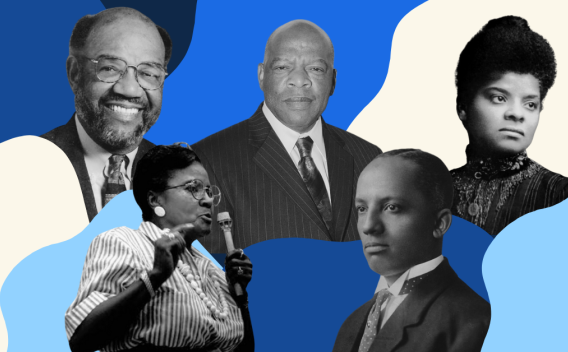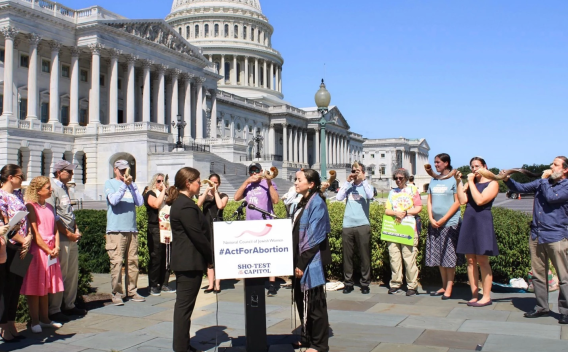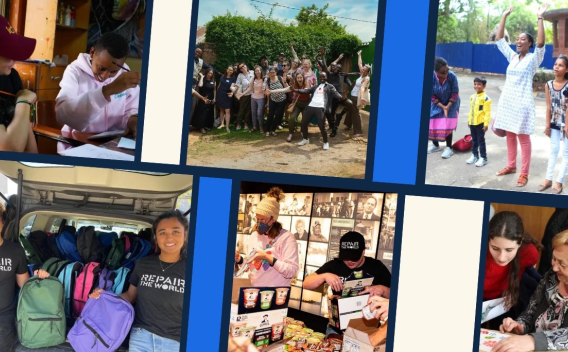By
Published
August 27, 2021
Tags
We are pleased to share this reflection from Dalia Fleming, Executive Director of Keshet UK and an ROI Community member, as part of a series spotlighting leaders building more equitable and inclusive Jewish communities. Read additional reflections from Tiffany Harris, Chief Program Officer of Moishe House and Yoshi Silverstein, Founder and Executive Director of Mitsui Collective.
Content Warning: The reflection below references harmful comments about transgender people.
Like many young LGBT+ people, I didn’t have the best time in school. Mainly this was because I was a geek or nerd (or as we said in the UK at the time, “a boff”), but, over time, I discovered there was more to my discomfort. During a class in my Orthodox Jewish secondary school at age 15, my teacher told me that I should marry a man and that being LGBT+ was unacceptable. Of course, teachers aren’t perfect and will make mistakes, but no one should ever have a teacher tell them that who they intrinsically are is bad.
Since then, I’ve been drawn to making sure that other young people won’t have to bear a similar experience. I began volunteering with KeshetUK to work with UK Jewish communities in ensuring that Jewish LGBT+ people and our families are included throughout Jewish life. In 2017, I became KeshetUK’s first-ever Executive Director.
That’s how in 2018, I found myself back at my Orthodox secondary school—this time delivering a workshop to students on LGBT+ wellbeing. Every year, KeshetUK connects with thousands of young people in schools and dozens of young leaders in youth organisations. We also deliver training to teachers, synagogue leaders and members, and to summer camp leaders in the UK and elsewhere in Europe.
A Partnership Approach
The needs of Jewish LGBT+ people are not being fully met by UK Jewish communities. LGBT+ people experience poor mental health and isolation when in spaces where they feel unwelcome and unsupported, are uncertain about their role in the community, or feel unable to participate. KeshetUK is driven by a firm conviction that every Jewish organisation can become more inclusive of Jewish LGBT+ people and our families.
That is why we pride ourselves in being nimble and responding to the needs of those with whom we work. Jewish communities are diverse and there is no single approach that will work for everyone. In the UK, most Jewish people affiliate with Orthodox or traditional communities, and there are growing and thriving progressive communities, too. KeshetUK works in partnership with each community to identify their goals and tailor our support accordingly.
An example of our partnership approach is our decision to jointly produce The Wellbeing of LGBT+ Pupils: A Guide for Orthodox Jewish Schools with Chief Rabbi Ephraim Mirvis of the United Hebrew Congregations of the Commonwealth. Our partnership on this guide with the Chief Rabbi led to an unprecedented number of Orthodox schools—like the one I attended as a student—reaching out to KeshetUK. Our work in these schools has proved vital; in helping them implement lessons from the guide, we serve as the educators on LGBT+ inclusion so that the LGBT+ folks in these school communities don’t have to.
Transgender Inclusion
While advancing LGBT+ inclusion in schools is a major part of the work we do at KeshetUK, we also take on the role of educator outside of the classroom. An issue where we see increased requests for support and guidance across Jewish communities is around transgender inclusion.
Trans people are thriving in so many ways when it comes to building strong and beautiful community spaces. But they also tell KeshetUK that they are fearful for their psychological and physical safety when walking in the streets or on entering many Jewish community spaces. To make matters worse, much of the public conversation about trans people is inflammatory, and genuine questions and feelings are met with callouts and judgements. These toxic conversations do little to create a better society where all of us can truly be ourselves.
Jewish communities and leaders tell us they want to have effective conversations but feel anxious and don’t know where to start. Some Jewish communities where ritual, family and social roles are based on a traditional gender binary are not sure how to include or talk to their trans and non-binary members. Across all Jewish communities in the UK, whether traditional or not, we hear confusion and fear about what it means to be trans-inclusive. That’s where KeshetUK comes in.

Dalia Fleming (left) and Benjamin Ellis, Chair of the KeshetUK Board (Photo: Yoni Bock)
Creating Spaces for Learning and Reflection
Jewish tradition encourages learning by asking questions and by listening to one another. When communities and leaders work with KeshetUK, we encourage them to ask the questions they want to ask and use the language they know. Even if the questions they ask during a session with us feel threatening or hurtful to an LGBT+ person, we assume that they come from a well-meaning place and respond accordingly. This helps create genuinely brave spaces for learning and reflection.
For example, someone might ask, “What name should I use for someone when talking about the time before they transitioned?” or “What do I do if my friend says that trans people are dangerous?” The answers might seem simple (“Use whichever name they currently use unless they’ve told you otherwise” and “They aren’t”). But if we give abrupt answers like these, the person asking won’t develop any tools to help combat the transphobia and narratives that make life tough for trans people. In addition, criticising someone for even asking these questions will waste a potential learning moment and possibly lead to shame, which is unhelpful for educating.
Keshet UK is unashamedly a trans-inclusive organisation. We make sure to listen carefully and with humility to trans people’s descriptions of their experiences and needs, and we invite people to hear these with us and reflect on what this means for their community. Our educational approach does mean that we hold conversations and spaces that we know many trans people would find painful. We are mindful of this and do everything we can to support staff, volunteers and participants. But, as a supporter once said to us, “KeshetUK has these conversations so that LGBT+ people that don’t want to or can’t have them don’t have to.”
Ultimately, we believe that by calling people in rather than calling people out and by creating non-judgemental spaces for learning and listening, we will create the inclusive communities we all want to see.
Opening the Conversation
KeshetUK is the only UK organisation that provides education and training to Jewish community institutions and leaders to create a world where no one is forced to choose between their Jewish and LGBT+ identity. When communities want to talk, we want to listen and learn. Together with community members and leaders, we are committed to exploring how to best drive change so that Jewish LGBT+ people know they are safe, welcome, wanted and respected.
I hope that in 5782 more UK Jewish communities and leaders come forward to take part in these conversations. That those of us who are able will put ourselves in positions where we can hold the tension and conflict. That we will actively create moments for learning and respond effectively when we hear things that make Jewish LGBT+ people—and especially trans Jewish people—feel unsafe. We all have a lot to learn, and we will only make progress with questions, with answers and with conversations.
This year, let’s make sure we make time to talk.
Charles and Lynn Schusterman Family Philanthropies welcomes the expression of personal thoughts and reflections on our blog. Each post reflects the opinion of its author and does not necessarily represent the views of our organization or our partners.






